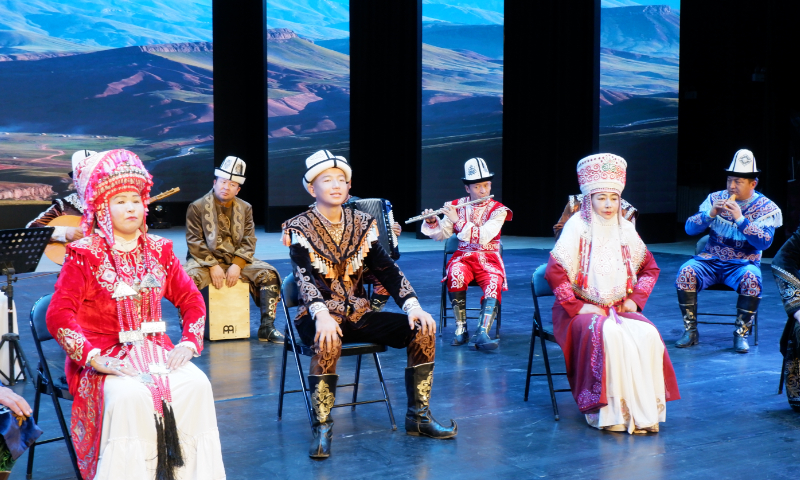GT investigates: Feeling Xinjiang's intangible cultural heritage

Looking at Xinjiang, and the unique cultural traditions of its various ethnic groups - such as Kazakh throat singing on the grasslands, the Kirgiz eagle hunting customs on the Pamir Plateau, and the Xinjiang songs sung at the foot of the Tianshan Mountains - one can see these diverse ethnic cultures are equally cherished and deeply rooted in the fertile soil of Chinese civilization.
GT reporters again travelled to Xinjiang Uygur Autonomous Region. In this first installment of a series of articles, GT tells character stories based on ethnic cultural inheritance in Xinjiang, which powerfully refute the false information made up by some anti-China forces claiming that "Xinjiang adopts an assimilation policy towards ethnic minorities in an attempt to systematically eliminate Uygur culture."
"Sing it again, follow me..." Under the guidance of their teacher, a group of young students sing in unison with their faces showing seriousness and joy. They are students at Class IV in the ninth grade at the Middle School of Hezwey town in Wuqia county, and they are singing one of the three major epic poems of China's ethnic minorities - Manas.
"How much has the earth changed, with valleys drying up and turning into wastelands, wastelands transforming into lakes, and lakes evolving into fertile fields... Everything is constantly changing, yet the stories of our ancestors have been passed down to this day." The students have deep and powerful voices, along with a passionate demeanor.
Children in Wuqia county in the southwestern part of Xinjiang have grown up almost always accompanied by the song of Manas.
Manas is the legendary hero of the Kirgiz ethnic group, and the epic poem Manas is named after him. It tells his story and the story of seven generations of descendants leading the Kirgiz people to defend their homeland and pursue a happy life. This epic poem, which spans 230,000 lines, can be called the "encyclopedia" of the Kirgiz ethnic group.
Yumtal Yetku, a 15-year-old Kirgiz boy, is one of the inheritors of the poem, studying under the tutorage of Janur Turgaby, a representative inheritor of the Manas intangible cultural heritage project at the autonomous regional level.
When he was 3 years old, influenced by his mother, Yumtal developed an interest in reciting the epic poem. Through years of practice, he honed his skill in reciting it, becoming a well-known "little Manas Qi" (young reciter of Manas) in the local area.
"Although we Manas Qis have an excellent memory, the teacher never lets us hold the text for rote memorization. Instead, he interprets it for us first, and we then recite and sing it after really understanding it," Yumtal told the Global Times. "If we do not understand the hero's emotions, how can we handle the movement and expression of singing, let alone making innovative expressions in our own language?"
When talking about Manas, Yumtal always has a smile on his face. It is not difficult to see that learning Manas brings him joy and a sense of accomplishment. The ability to sing more than 1,000 lines of Manas has allowed Yumtal to surpass his peers. Yumtal said that now he can memorize the content of some eight chapters and sing continuously for half an hour.
In addition to learning from Janur during summer and winter vacations, he also has the opportunity to practice at school. The school has established a club for students interested in Manas, and under the guidance of music teacher Tohtkul Kurbanali, more than 40 club members have the opportunity to learn the poem twice a week. Yumtal has become their tutor.
Zhang Yifan, a 15-year-old Han girl, is also a member of the club. When learning the lyrics of Manas, she writes down the pronunciation in pinyin and often asks her classmates for help. For these children who are about to face the high school entrance examination, singing together is also a great way to relieve stress.
In the local area, people can be seen singing and performing Manas everywhere. The inheritance and protection of the poem is not limited to this school club.
In 2006, Manas was included in the first list of national intangible cultural heritage, and in 2009, it was included in the UNESCO Representative List of the Intangible Cultural Heritage of Humanity. In recent years, with the joint efforts of experts and scholars from various ethnic groups, the research and protection of Manas has achieved remarkable results, such as training of artists, organizing competitions and academic seminars, and publishing and translating the epic poem into multiple languages.
In 2009, the Kizilsu Kirgiz Autonomous Prefecture established the Intangible Cultural Heritage Protection (Manas Protection and Research) Center, and has continuously held the Manas international cultural tourism festival and singing competition. At the same time, cultural inheritance training classes have been held in cultural centers, schools, and township comprehensive cultural stations, establishing a team of inheritors that combine the old, middle-aged, and young.
Yumtal told the Global Times that his favorite part of Manas is when the hero turns defeat into victory in a battle. Yumtal admires Manas' courage and determination. Now, this young inheritor of the epic poem also has the same courage. He has participated in the Manas international cultural tourism festival, and often performs with his predecessors on the stage, honing his skills.